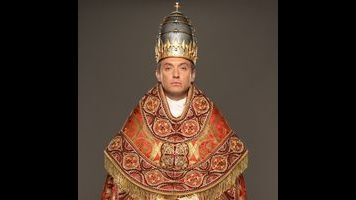The Young Pope is sublimely ridiculous

The young pope knows. Despite his relative wetness behind the ears, 47-year-old Lenny Belardo (Jude Law) is firm in his infallibility, his fundamentalist dogma, and his belief that the Christian God occupies a house located in the vicinity of the Big Dipper. He knows what he knows, and what he knows is the truth, and he knows those who disagree are either political enemies engineering his downfall or faithless sinners who’ve turned their backs on the almighty. The man rechristened Pope Pius XIII also knows there’s a kangaroo wandering the Vatican grounds, and he can make it jump with a simple verbal command.
And The Young Pope knows, too. It knows this is all ridiculous. Created and directed by Oscar-winning filmmaker Paolo Sorrentino (who also wrote or co-wrote all 10 episodes of its first season), the spirit of the HBO series is expressed in a wink, the type Law gives to the camera at the end of a title sequenced set to a deconstructed cover of “All Along The Watchtower.” There are many here among us who feel that life is but a joke, and Sorrentino’s punchline involves the legacy of a progressive world leader being spitefully wiped away by his successor, an impulsive, conservative vulgarian with a habit of contradicting himself, who carries a chip on his shoulder the size of the Pietà. Imagine that.
Parallels between Lenny and President-Elect Donald Trump aside, The Young Pope doesn’t tether itself to our reality. Like Sorrentino’s English-language debut—the Sean Penn-in-Robert-Smith-garb road movie This Must Be The Place—the series has a healthy sense of the surreal, suffused with fantastical imagery, elliptical dialogue, and arthouse technique. Its larger-than-life characters are given humorously banal eccentricities: Lenny likes Cherry Coke Zero; his guardian angel/attack dog, Sister Mary (Diane Keaton), sleeps in a novelty T-shirt. This mischievous streak is absent from the way the show has been marketed, setting the show up as an object of online ridicule, another expensive Peak TV drama about a difficult man acting difficultly. But The Young Pope excels at confounding prestige-drama conventions from the start: There’s the opening shot of Law crawling out from beneath a mountain of CGI infants, but also the puckish notion of making a TV series about workplace maneuverings when that workplace is the Vatican. This is the HBO (which co-produced the series with European outlets Sky Atlantic and Canal+) of The Leftovers and John From Cincinnati, not crowd-pleasing Sopranos–and-Game Of Thrones mode.
That said: Anyone who counts Varys as their favorite Game Of Thrones character might have a new favorite show on their hands. When there’s plot on The Young Pope, it’s driven by political machinations, usually the doings of former papal puppet-master Cardinal Voiello (Silvio Orlando). A media darling who conspicuously litters the scenery with copies of his latest biography, Voiello sows seeds for Lenny’s downfall, aided by the pope’s mentor, Cardinal Michael Spencer (James Cromwell). Voiello’s vanity and his devotion to his hometown football club put him in stark contrast to Lenny, who seeks to cultivate an air of mystery around his pontificate. He shuns photography, and denies requests to be depicted in official (and lucrative) Vatican merchandise, much to the chagrin of marketing director Sofia (Cécile De France).
Unfortunately, viewers of The Young Pope come out knowing as little about Lenny as his followers do. He’s far from the only main character on TV to define himself through enigma and hypocrisy (see: Draper, Don), but there’s a certain bloodlessness in the satirical, surrealist format of The Young Pope that exaggerates the emptiness of this primetime cipher. It’s a challenge that Law rises to, enlivening Pope Pius XIII through stately affect (the words “Cherry Coke Zero” will never sound the same again) and a tide of rage that stems from the character’s abandonment issues and swells into lengthy, spittle-flecked addresses to the faithful, expressing a zero-tolerance doctrine that, again, can be hard to swallow at the dawn of the Trump administration.
Sorrentino is a stylist, arranging his cast in tableaus that mimic the antiquities and masterworks that surround them, but he draws beguiling performances out of those actors as well. Like Law, Keaton sinks her teeth into a fairly thin steak of a character, a hard-nosed protector who lets Keaton flash cunning and devilishness that she can’t in, say, Love The Coopers. The cardinals function as a reliably entertaining Greek chorus, and Ludivine Sagnier—playing the wife of a Swiss guardsman who forges a connection with Lenny—injects an earnestness into what’s otherwise a highly ironic affair.
The Young Pope keeps its audience at a distance, but it also keeps that audience guessing. And not just about the next curveball it’s going to throw or abrupt left turn Lenny’s going to take, but about the fundamental mysteries of faith. For all his convictions, Lenny isn’t always sure that God is listening. Missed connections and garbled communication are motifs throughout the five episodes of The Young Pope screened for critics, in which fuzzy radio reception, failing hearing aids, and lip reading all play a part. Lenny is a character who was left at an orphanage by hippie parents, who developed a strained relationship with his fellow orphan and surrogate brother Andrew (Scott Shepherd), and who seeks a greater separation between clergy and congregation. The young pope is skilled at being unknowable. For good and for bad, so is The Young Pope.
Reviews by Eric Thurm will run twice weekly.